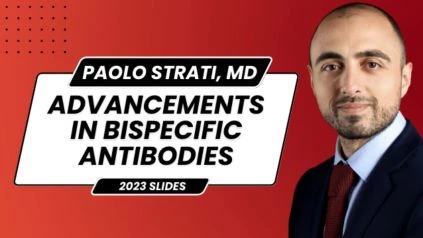By: Allen Wilbanks
Date: September 28/2023
Paolo Strati, MD, an assistant professor at the Anderson Cancer Center in Houston, Texas, delivered a comprehensive presentation on bispecific antibodies and their comparison to CAR T-cell therapy for patients with diffuse large B-cell lymphoma and follicular lymphoma. Dr. Strati emphasized the importance of collaboration in the field and discussed the development of bispecific antibodies, highlighting their journey from single-chain variable fragments to FDA approval.
He mentioned that there are currently two FDA-approved bispecific antibodies for relapsed/refractory diffuse large B-cell lymphoma: Coritamab and Glofitamab. These antibodies showed promising preclinical and clinical results, with a focus on cytotoxicity and response rates in difficult-to-treat patient populations.
Dr. Strati also discussed the integration of bispecific antibodies and CAR T-cell therapy. He explored the advantages and disadvantages of both approaches, considering factors such as off-the-shelf availability, toxicity, and cost. He stressed the need for biomarkers to help identify which patients may benefit more from one approach over the other.
Furthermore, he delved into the use of bispecific antibodies before or after CAR T-cell therapy and how these strategies could be applied to follicular lymphoma, emphasizing the need for more clinical data and real-world experience.
In conclusion, Dr. Paolo Strati’s presentation provided valuable insights into the evolving landscape of lymphoma treatment, highlighting the potential of bispecific antibodies and their integration with CAR T-cell therapy

